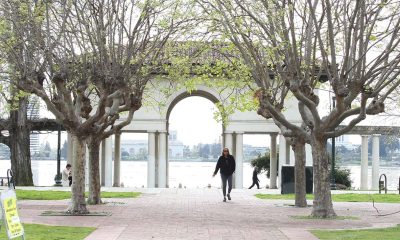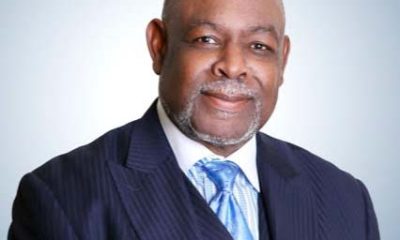Business
From Convict to Co-Owner
Alphonso “Tucky” Blunt, the co-owner of Oakland-based marijuana dispensary Blunts+Moore, recalls learning the ropes of running a business from his father who owned a car detailing shop. Working
for his father in his teenage years helped him build rapport with community members who later became his clients when he started selling weed without a license.
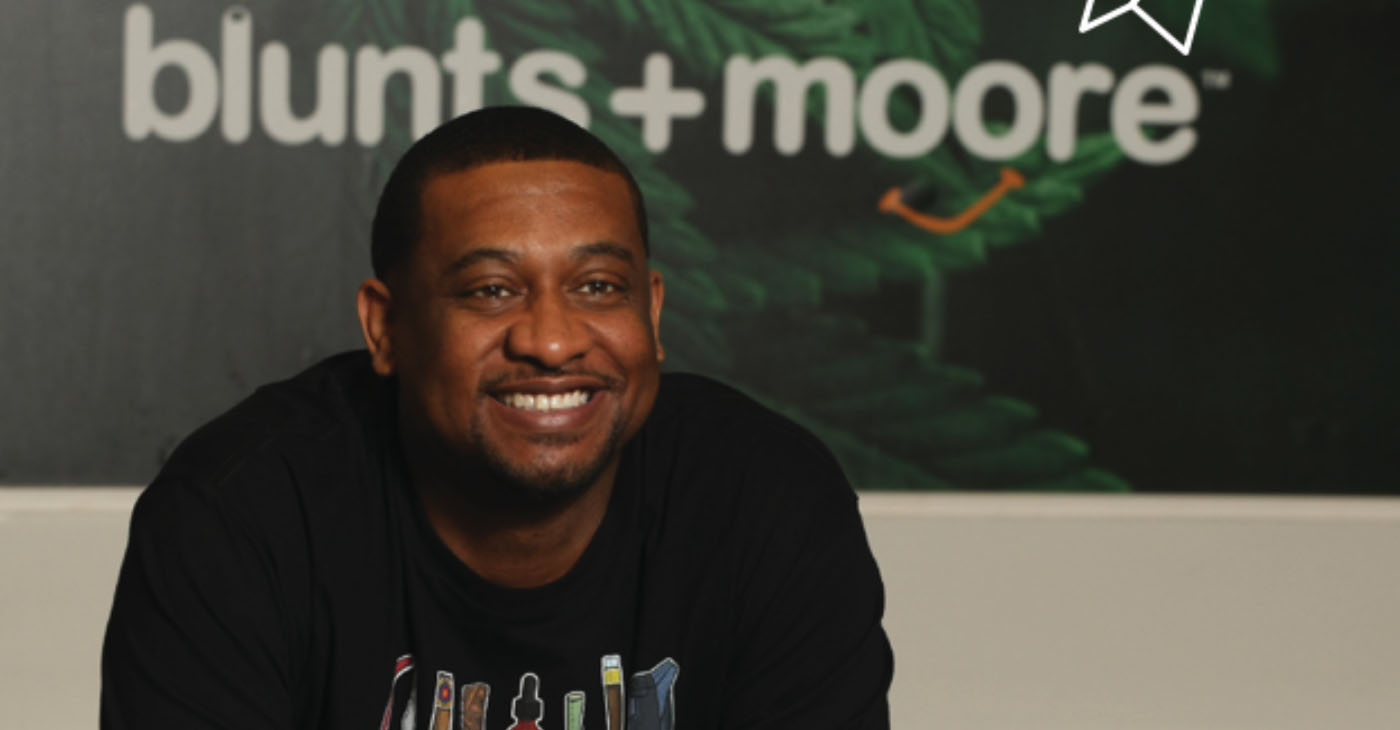
Oakland Businessman Brings Street Knowledge to Cannabis Business
By Bo Tefu | Impact Alameda and Photos by Auintard Henderson
Landing his first job at 13 years old through the Youth Employment Partnership, an education and workforce training program based in Oakland, minority business owner Alphonso “Tucky” Blunt says being broke and street smart helped fuel his entrepreneurial drive.
As an Oakland native, Blunt was affected by the war on drugs. He says he is familiar with how it harmed many people in his community, causing displacement, distress and public health issues.
“I went through childhood troubles,” he says. “My parents had fits of drug addiction, so I lived with my grandmother.”
“I’ve been in a shelter before, but I never let none of that be a deterrent,” he adds.
Blunt, the co-owner of Oakland-based marijuana dispensary Blunts+Moore, recalls learning the ropes of running a business from his father who owned a car detailing shop. Working
for his father in his teenage years helped him build rapport with community members who later became his clients when he started selling weed without a license.
Prior to starting his own business, Blunt worked for Alameda County as a specialist clerk for 13 years, until he realized that his weed selling side-hustle generated moreincome than his regular nine-to-five job.
His client base grew by word- of-mouth which inspired him to explore other business ventures including an online retail store and clothing line.
However, Blunt’s life took a detour in 2004 when he got arrested for selling marijuana without a license.
“I wanted to open a dispensary since 1999 but I never thought Black people could open dispensaries,” Blunt says. “It was a different time back then and I’d never seen a Black owner.”
Owning his dispensary was a full-circle moment for Blunt, who won his cannabis license from the city of Oakland’s dispensary permits lottery draw.
“I didn’t know I was going to win that lottery, so to win that lottery and then be where I am now, shows that it was meant to be,” he says. “I believe I was destined to do it at some point.”
In this Q&A, Blunt shares some details about his entrepreneurial journey, Oakland’s Equity Program, and the lasting impact of the war on drugs in minority communities.
How did you start your business?
I have a strong background in the cannabis business. I worked in dispensaries and was familiar with the ABC’s of the industry. My goal was to ultimately open a dispensary and have a space that I can share space with other vendors.
Being from Oakland, I’m really big on community and unity. I share my space with other vendors. I don’t charge them any money to come on-site. I also give them a discount on products if they come to the store.
I’m currently raising money for other dispensaries and equity brands by selling T-shirts. For every 100 T-shirts we sell, $500 of the proceeds go to creating equity.
My goal was to open a dispensary in my city — in the area where I caught my legal case, to show people that look, dress, talk, and act like me can be in the cannabis industry and thrive. It’s important for people who’ve been in similar situations as me to see that they can take up space in the industry. Black people set trends in the cannabis industry. To keep it real, we are the space, but we’re not represented well and that has to change.
What kind of support did you receive from the local government when you started your business?
The city helped us get our license. At that time, there were no loans and grants, none of which was in place when we started our business. We had to outsource and find funding, which is hard in most cases because most of the funders are sharks. The city then put us with a consulting firm that helped us get a loan from a company.
There was no incubation involved. Some people used nondisclosure agreements just to discuss and initiate a deal. Some people even tried to find us property deals that had liens on it. We’ve had our fair share of bad deals.
Overall, the city’s Equity Program is a great program. It just needs more education and funding. I don’t mean book education. I mean getting people on the board and oversight committees who’ve actually sold cannabis before. We can avoid people signing their life away with bad deals because they just see a little bit of money dangling in their face and they don’t know what to do.
Why do you think it’s important to have minority business owners in the cannabis industry?
Looking at other industries like alcohol and tobacco,we can’t really get access to those industries. Cannabis is one of the last industries we can actually tap into. It’s important because we can build generational wealth for our communities.
We can access different parts of the industry, not just growing and selling. We can get in this space and learn how to make the lights and grow rooms for the plants, or to make the thermometers used to test the water and products that go in the water for nutrients. There are so many avenues that we can get into. Once we tap into those spaces, the industry will be life changing.
How did the war on drugs affect you and your community?
It was a war on Black people and drugs. It was a failed War on Drugs. But the war on drugs was “effective” in the sense that everyone I knew went to jail.
For me to be able to come out of that system and be able to sell weed legally in the city, I was arrested in, then to have to work with the police captain, who is the same officer who arrested me back in 2004, tells you how far the war on drugs has come. We still have a long way to go. We can’t start a conversation about the war on drugs without trying to right its wrongs, which is why we need to vote for the right people.
With effective equity programs, we can also prevent a reverse war on drugs where businesses are struggling to survive and accepting crumbs on the dollar from investors. I believe we can fight for equity, but it will take time for our communities to heal from the war on drugs.
How has the pandemic affected your business?
In the first two weeks of the shelter in place, sales skyrocketed all over the cannabis space, everybody was stocking up to be in the house. By the fourth week sales leveled off and sales were going back to normal. Then we got looted. So, it’s been rough. This time we’re dealing with the coronavirus and the protests. We were affected just like all other businesses.
When the looting happened, I went online saying “don’t retaliate, educate.” Two weeks later we hosted a community fundraiser, hosting a concert, on Tupac’s birthday and raised over $10,000. I split the amount among four dispensaries, excluding our own. We also plan to work with local vendors and have food trucks back at the store. We are remaining positive. Business is slowly starting to pick up.
Business
Is an Employer or Landlord Using Your Felony Conviction Against You? Here’s What You Can Do
The California Department of Fair Employment and Housing (DFEH) is also encouraging the public to report housing ads that use discriminatory language to exclude certain racial groups, immigrants, people with felonies, and applicants with Section 8 or U.S. Department of Housing and Urban Development (HUD) vouchers; etc.
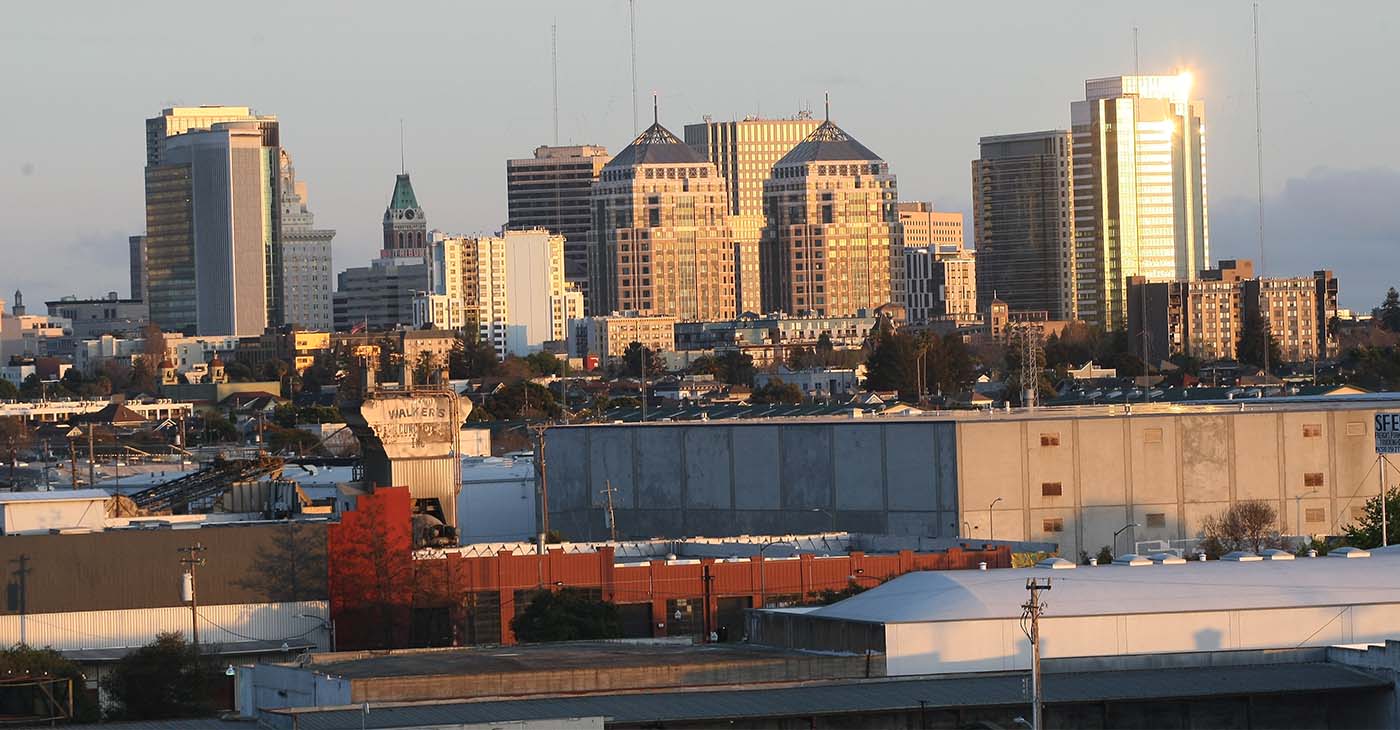
Edward Henderson | Impact Alameda
The California state government has been reminding businesses and landlords across the state that it is illegal to discriminate against job and rental applicants because they have committed felonies or misdemeanors in the past.
The California Department of Fair Employment and Housing (DFEH) is also encouraging the public to report housing ads that use discriminatory language to exclude certain racial groups, immigrants, people with felonies, and applicants with Section 8 or U.S. Department of Housing and Urban Development (HUD) vouchers; etc.
“The California Department of Fair Employment and Housing announced a new effort to identify and correct violations of the Fair Chance Act, a pioneering state law that seeks to reduce barriers to employment for individuals with criminal histories,” a DFEH statement read.
The Fair Chance act, which took effect on January 1, 2018, was written to increase access to employment and housing for Californians with criminal histories — a way to reduce recidivism, among other goals. Employers with five or more employees are prohibited from asking a job candidate about conviction history during the hiring process or when advertising a vacancy.
Since the law passed, the state has sent more than 500 notices to businesses informing them that they have violated protections put in place to protect people seeking work.
The DFEH says it is implementing new technologies to conduct mass searches of online job applications that include unlawful statements. For example, some businesses explicitly state in hiring advertisements that they would not consider applicants with criminal records.
“Using technology to proactively find violations of the state’s anti-discrimination laws is a powerful strategy for our department to protect Californians’ civil rights,” said DFEH Director Kevin Kish. “DFEH is committed to preventing employment discrimination through innovative enforcement actions and by providing clear guidance to employers.”
DFEH released a toolkit to aid employers in adhering to the Fair Chance Act guidelines. The toolkit includes sample forms and guides employers can use to follow required procedures; a suggested statement that employers can add to job advertisements and applications to let applicants know that they will consider individuals with criminal histories; answers to frequently asked questions (FAQs) about the Fair Chance Act and an informational video that explains the Fair Chance Act.
In addition, DFEH plans to release an interactive training and an online app this year.
Before authorities lifted the statewide COVID-19 public health restrictions, DFEH also warned businesses against masking discrimination with COVID safety precautions.
“As Californians navigate the COVID-19 pandemic, the Department of Fair Employment and Housing has provided guidance to protect civil rights and mitigate risk of COVID-19 transmission in employment, housing, healthcare, and, in our guidance released today, businesses open to the public,” said Kish. “We can and must uphold civil rights while simultaneously disrupting the spread of COVID-19.”
DFEH encourages individuals to report job and housing advertisements violating the Fair Chance Act or other instances of discrimination.
Visit the DFEH website to file complaints. (https://ccrs.dfeh.ca.gov/s/login/)
Business
Volunteer to V.P.: Margot Dashiell Fights for Families Dealing With Mental Illness, Trauma
“I work with families to support individuals within the family and to navigate the very complicated and inadequate system of mental health in the county,” said Margot Dashiell. The outreach program hosts public meetings five times a year for the families of people with mental illness. Each of the meetings includes psychiatrists and other mental health service providers specializing in crisis response, substance abuse, and mental illness. People struggling with mental illness are still stigmatized although mental health support in Alameda County has improved. The negative perceptions associated with behavioral health are also connected to social justice issues that disproportionately affect Black and Brown people from low-income communities.

Bo Tefu | Impact Alameda
Margot Dashiell became an activist advocating for people living with mental illness in Alameda County following her career as a Sociology and African American Studies professor at Palo Alto Community College.
The community leader has committed more than 20 years of her life and career to supporting people with severe mental illnesses and their families. Her track record as a volunteer working to improve the quality of life for mentally ill individuals and their families has helped improve the behavioral healthcare system in Alameda County. As the vice-president of the National Alliance on Mental Illness, East Bay, Dashiell has leveraged her network to spearhead behavioral health initiatives and programs.
“It’s in my DNA. I’ve been an activist all of my adult life. A lot of it was around racial justice and equity. It’s just in my nature to try to work on behalf of change,” said Dashiell.
The retired professor worked on the Mental Health Services Act (MHSA), a California landmark ballot initiative approved in 2004 that has helped to fund mental health services across Alameda County. Titled Proposition 63 voters approved the legislation that has contributed to mitigating the lack of funding for mental health services in California state hospitals. Thirty years ago, the state cut back on funding services that treat individuals with severe mental illnesses. The MHSA places a 1 % tax on personal income above $1 million, the funds get redirected to mental health services across the state. It has generated more than $15 billion for individuals with mental illnesses and disabilities.
According to Mental Health Services Oversight and Accountability Commission (MHSOAC), more than 2 million people in California are affected by potentially disabling mental illnesses every year.
The lack of resources to support African American families who take care of relatives with mental illnesses inspired Dashiell to work as a facilitator in the African American Family Outreach Program. The program hosted by the Mental Health Association of Alameda County is a support group for Black families with mentally ill relatives. The program, funded by the Alameda County Behavioral Health Agency is one of many projects which aim to reform the behavioral healthcare system for underserved communities.
“I became involved in mental health issues working on behalf of families and people who have a serious mental illness. Having it in my family for over three generations, I became involved in trying to support not only in my own family but family members in the community,” said Dashiell.
The limited resources in the behavioral health care system make it hard for Black families to best care for mentally ill relatives which can be catastrophic for their family dynamic.
“I work with families to support individuals within the family and to navigate the very complicated and inadequate system of mental health in the county,” she said.
The outreach program hosts public meetings five times a year for the families of people with mental illness. Each of the meetings includes psychiatrists and other mental health service providers specializing in crisis response, substance abuse, and mental illness.
People struggling with mental illness are still stigmatized although mental health support in Alameda County has improved. The negative perceptions associated with behavioral health are also connected to social justice issues that disproportionately affect Black and Brown people from low-income communities.
The War on Drugs inflicted harm on many Black and Brown families across the United States. The trauma criminal justice system-imposed trauma on Black and Brown families which catalyzed mental health challenges in diverse communities.
According to a research report by the MHSOAC, 17 % of people incarcerated in local jails have a serious mental illness, a rate more than three times that of the general population.
The research report stated that people with mental health needs or experiences of trauma often have addictions to drugs or alcohol and are vulnerable to poverty and homelessness. Researchers of the report claimed that major consequence of the criminal justice system that is overwhelmed by a population it was never designed to serve.
“Mental illness is connected to very serious social problems, it impacts the community in very deep ways. The homeless are living with mental illness, a large proportion of the people in the county jail, are living with mental illness,” said Dashiell.
“Support and adequate resources for people with serious mental illness are very critical,” she said.
Dashiell also works to dispel misconceptions about mental illness that prevent Black people from receiving the help they need to overcome mental illness.
“Mental illness is very hard on the individuals who are afflicted,” said Dashiell.
“It’s a misconception that people are in control of mental illness. People often think they are in control, they don’t realize the depth of the illness,” she said.
The stigma associated with medical treatment for severe mental illness is another point of concern among Black families. However, experts say, receiving professional help is the best option for both the individual and their family. Medication is often necessary for severe conditions such as schizophrenia and bipolar disorder. Skilled psychiatrists work closely with individuals to prescribe medication that helps improve the quality of life for someone who is mentally ill.
“It’s important to notice early symptoms so people can get early treatment and offset some of the severe symptoms of mental illness,” said Dashiell.
“Social relationships and cognitive processes are not functioning when people experience hallucinations, delusions, the inability to concentrate or have difficulty working. And it’s not the person’s fault,” she said.
The intersection of homelessness and mental illness is pivotal for the advancement of behavioral health in Alameda County. Dashiell is currently working with East Bay Supportive Housing Collaborative (EBSHC) to offer mental health support for homeless people in Alameda County.
The project aims to build housing units with support programs that serve the homeless population. A long-term goal of the project is to create social impact through public policy to eradicate homelessness in Alameda County.
Business
Protect Your Mental Health: Four Things You Can Do in Your Own Space (at Your Own Pace)
Shanice Smith, a social worker at Roots Community Health Center in Oakland, offers tips on different ways people can keep their mental health in check.
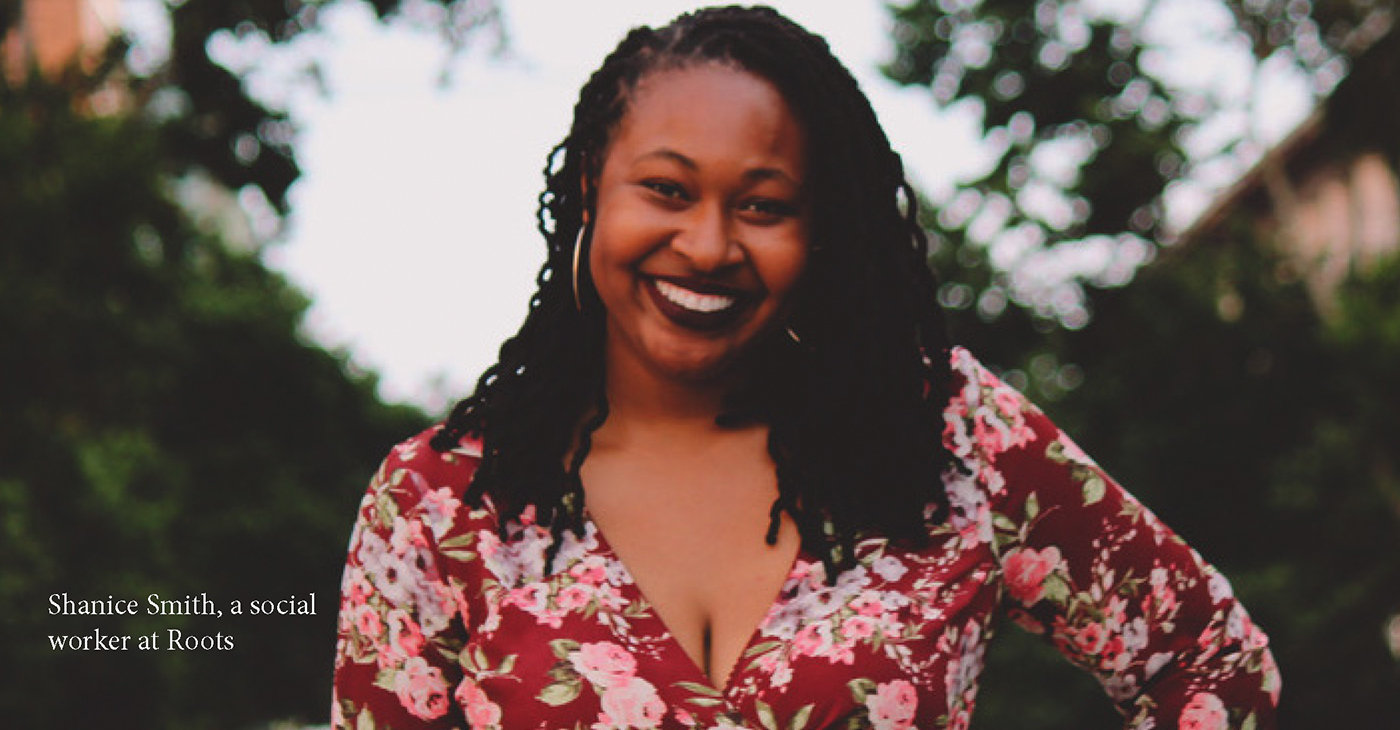
Bo Tefu | Impact Alameda
Shanice Smith, a social worker at Roots Community Health Center in Oakland, with extensive experience in behavioral health is offering tips on different ways people can keep their mental health in check, especially as we begin to head out of the global pandemic
Smith highlights the importance of developing effective mental health practices “to build a resilient community.”
Practice Self-Care, It’s Not Just a Buzzword
Self-care is about self-preservation. It’s important to make sure that you are doing something for yourself, even if it’s 30 minutes a day. So, find activities that can help curb your anxiety. For some people, it can be a fun hobby or a task such as meal prepping, as long as it can help you feel better about yourself.
Plan Your Day Around What You Can Control
The COVID-19 pandemic has made many people anxious about the future. There is no guaranteed timeline for when COVID-19 will end, however, you can plan out your day and figure out what you can control. A key lesson the pandemic taught us is that certain things are out of our control, so we need to be cognizant of the way we handle inconveniences. There are times you should also need to let things go when they are beyond your control or not working in your favor. The best way to bounce back is to focus on the things that you do have control over and make that better if possible.
Communicate with the People You Care About
The majority of people are overwhelmed with balancing their responsibilities, so it’s important to let people in your life know what’s going on. Communication can help avoid any misunderstandings and can present opportunities for you to talk about your experiences. Talking to friends and family does not mean that you should not work with a mental health professional. Consult a mental health professional if you recognize the need for mental health support.
Go Out for Fresh Air
Being indoors for many days can affect you mentally, physically, and spiritually. It’s important to follow recommended safety precautions even if you are vaccinated but go outside and get some fresh air. It can help you feel better to spend time outside, whether you are enjoying a picnic, taking a walk, or doing an exercise routine. Take part in activities that will help boost your mood — as long as you feel safe and comfortable.
-
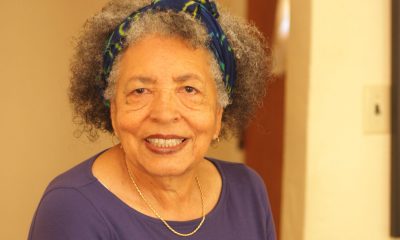
 Business3 years ago
Business3 years agoVolunteer to V.P.: Margot Dashiell Fights for Families Dealing With Mental Illness, Trauma
-
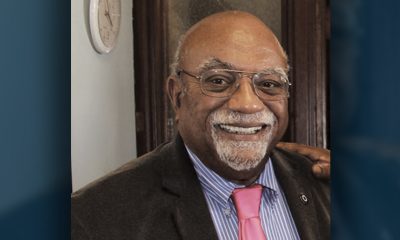
 Highlights3 years ago
Highlights3 years agoJuvenile Justice in Alameda County: We’re on Our Way but More Needs to Be Done for Our Children
-
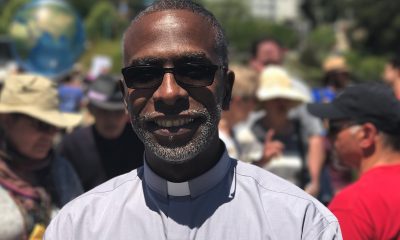
 Business3 years ago
Business3 years agoWalking by Faith, Leading with Love: Rev. Ken Chambers Invests in Alameda County
-
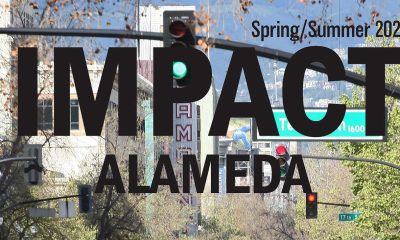
 Resource Guide3 years ago
Resource Guide3 years agoIMPACT MEDIA | SPRING / SUMMER 2022
-
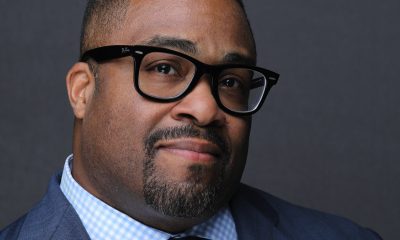
 Highlights3 years ago
Highlights3 years agoA Voice for Victims: Cal NAACP Is Helping to Clear Criminal Records for Free
-
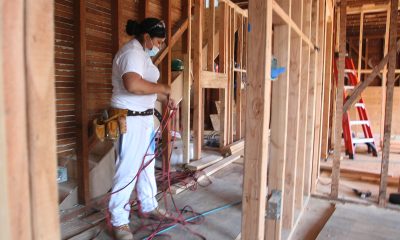
 Highlights3 years ago
Highlights3 years agoJustice = Jobs: YEP, an Oakland Org, Prepares Youth for Careers, Education Access
-

 Business3 years ago
Business3 years agoA Voice for Victims: Cal NAACP Is Clearing Criminal Records for Free
-
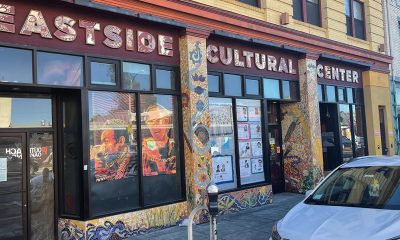
 Entertainment3 years ago
Entertainment3 years agoThe Art of Justice: Oakland’s EastSide Arts Alliance Offers Classes, Bookstore

